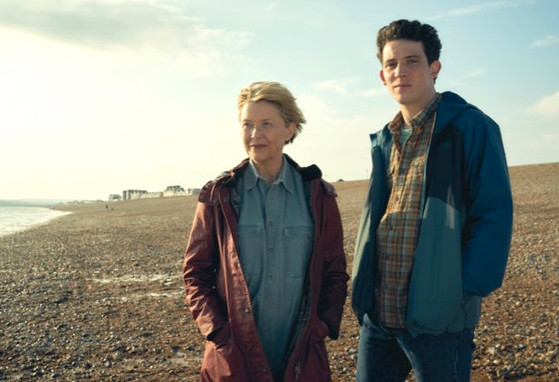by Nathaniel R

HOPE GAP (UK, William Nicholson)
Have you ever wanted to see Annette Bening play a retired British poet attempting to create her own 'Martha & George' dynamic with her unwilling elderly husband (Bill Nighy)? That was a rhetorical question. Of course you want to see The Bening do that as you'd want to see her do all things onscreen if you have any taste. Hope Gap, the second directorial effort from long time screenwriter William Nicholson (Gladiator, Shadowlands, Nell, etcetera...), is about a married couple of 29 years whose marriage has died. The wife just doesn't know it yet and continually "has a go" at her husband, eager to see him fight back or express anything at all. Their loving but avoidant son (Josh O'Connor, doing a 180 from his breakout role in In God's Country) is completely out of his depth as he is forced into the role of shoulder-to-cry on, referee, and messenger boy all at once. Though Bening struggles a bit with the accent, she's on typical fire when it comes to blending a well of complex emotion with crackling comic timing...
The movie she's playing in is more exciting than the one we're getting. The film's laughs come from Bening's exasperating but vivacious character but it's otherwise a somber drama about depression, loss, and moving on. Though the film is hit or miss, we found it a satisfying watch with a lovely cinematic ending though its apt to get dinged for being too stagebound (which it isn't really, other than in its clear two act structure). Bonus points for a hilarious relationship between The Bening and her dog. B

BOMBAY ROSE (India, 2019)
One has to marvel at Bombay Rose's very existence. Gitanjali Rao wrote, designed, and directed it and its clearly a labor of love with some gobsmacking visuals, intermittently blossoming from the rough underpaint quality of its animation. Unfortunately the story is lacking. If it were live-action we might call this Altmanesque due to the numerous interconnected characters but it doesn't necessarily flow. We enjoyed the nods to Bollywood cinema, and the romance between a Hindu flower girl and a Muslim flower seller but in the end it plays a bit like four short films conjoined by their unique visual style and stitched together through beautiful but repetitive filler imagery.
C+


PROXIMA (France, Alice Winocur)
MY ZOE (France/UK/Germany, Julie Delpy)
Here are two films from that all too under-populated subgenre - the mother/daughter drama and both are about women in ultra specific professions: an astronaut and a immunologist respectively. Proxima gives us the always welcome opportunity to see Eva Green in a dramatic lead. She plays a woman who is finally going to space but struggling to say goodbye to her daughter who she won't see for a year. Green is, as you might expect, excellent and the story of her training for the mission has all sorts of interesting scientific details if you feel like geeking out about them. The film's credits include a loving homage to the wealth of real life astronauts who are also mothers and it's easy to admire the film for this very underseen point of view. Unfortunately the film comes up short in other areas. Matt Dillon is the main source of conflict as a caricature of a sexist with an all too easy arc and the movie lacks the crackling tension that came to Winocur so easily in her most recent feature Disorder. Without a strong conflict at the center it plays a little flat. Still it was wonderful to see images of a woman being excellent at her job and her daughter looking on with love/admiration. We've seen the male version of that countless times in cinema. Bonus points: Eva Green switches regularly from French to German to English to Russian at the drop of a hat within the movie, reminding us what a gift she is to international cinema.
My Zoe, the latest from multi-hyphenate Julie Delpy of the Before trilogy fame, is much harder to love. Like Proxima it's ostensibly about a woman struggling to say goodbye to her daughter. The difference here is that daughter is on her deathbed and the mother goes to rather extreme places in refusing to actually be part of the 'saying goodbye' narrative. Delpy is, as we know a major talent, but her considerable gifts as an actress and writer, aren't coming out to play here and she hasn't given her co-stars (beyond Richard Armitage as her ex-husband) much to play. Though we hate to knock films for unlikeable characters (lots of people in real life are unlikeable) Delpy doesn't give us anyone to root for in the film and the film's lack of a sense of humor (even a dark one) or charm makes the running time feel much much longer than its 102 minutes. Delpy's character is single-minded and bitter and prone to blame everyone around her for all her misfortunes. Still the film doesn't really succeed as a character study since it's so caught up in its tragic plot. The mild sci-fi elements (it takes place in the near future) provide some Act Two interest but unfortunately very little pays off, especially given its tonally questionable ending.
Proxima B- My Zoe D+